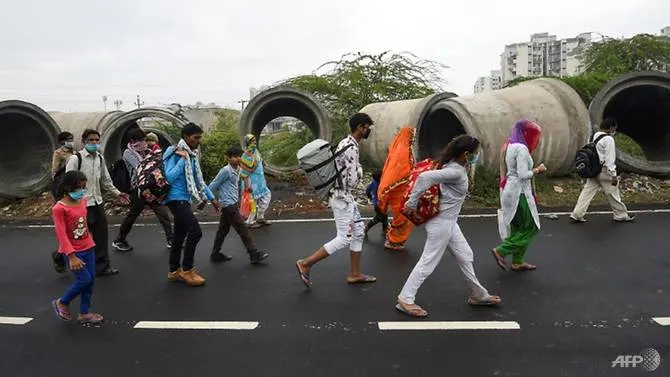Stranded by coronavirus lockdown, India migrant staff walk home
28 March, 2020

With India locked down over the coronavirus no way to make money, Dilipji Thakor faces a grim choice: Either walk home or die hungry.
Thakor is among an incredible number of migrant staff left jobless and penniless by the entire shutdown of the united states on Wednesday which has sparked an exodus from major cities.
Thousands are walking long distances back again to their home villages in the end transport was stopped aside from essential services as authorities battle to contain the outbreak, which has infected more than 700 people.
Huge numbers had crammed onto trains and buses prior to the country of just one 1.3 billion persons ground to a halt for three weeks, but numerous others were left stranded.
Now they want to get home any way they can, often by walking, with little money or food, and eateries and guesthouses closed on the way.
"Instead of die hungry, we decided to walk," said Thakor, who worked at a now-shuttered retail center in Ahmedabad in Gujarat state, as he trudged along a road.
Jamu Rathwa carried his daughter on his shoulders as he ambled along a highway from the western city of Surat, where until recently he earned around four dollars a day toiling on construction sites.
"At least we have a home and support system inside our village. Here (in Surat) we've nobody," Rathwa said.
Birender, a now out-of-work driver on metropolis limits of New Delhi, said that his family 320km away desperately wants him to come home in "in any manner possible".
"I haven't had an effective meal in the last three to four days ... I don't know what I will do here without food or anywhere to stay," he told AFP.
THOUSANDS ON THE MOVE
There are often around 100 million unskilled or semi-skilled migrant personnel in India, according to a government survey for 2016-17 -- around a fifth of the country's workforce.
Too little jobs, particularly in poor states such as for example Bihar and Uttar Pradesh, forces them to head to major cities and wealthier southern states.
They reside in cramped apartments, working extended hours for some dollars a day in often unsafe conditions with no social security.
Any money left after covering their expenses is repaid to their families.
India announced a US$23 billion welfare package to greatly help its poorest citizens with direct cash transfers and food subsidies. (Photo: AFP/Money Sharma)
Because so many are unregistered, it is unclear how many have finally travelled home and how many are on the highway, but media reports advise there are tens of thousands on the move.
Kana Ram, a district official at a border post between the states of Rajasthan and Gujarat, said 21,000 persons showed up on Thursday alone.
"The numbers have dropped significantly today but we remain getting around 500 people each hour," Ram said on Friday.
BACK, NOW WHAT?
India announced Thursday a US$23 billion welfare package to help its poorest citizens with direct cash transfers and food subsidies that reaches migrant workers.
The federal government in addition has called on local authorities to provide food, sanitation and accommodation to those on the road.
SpiceJet has even wanted to fly workers home for free, though authorities have grounded domestic flights.
The principle minister of the eastern state of Bihar, home to many migrant labourers, has said his government will set up relief camps -- where he insists "social distancing" will be implemented.
Authorities elsewhere have already been organising buses to collect some of those stuck on the highway, with health checks for everybody before they board.
Huge numbers had crammed onto trains and buses prior to the country of just one 1.3 billion people ground to a halt for three weeks, but numerous others were left stranded. (Photo: AFP/Money Sharma)
But there remains the dire rural poverty and lack of jobs that drove the migrant personnel away to begin with.
Abheek Barua, chief economist at HDFC Bank, said if this "reverse migration" continues, it'll put huge pressure on the rural economy.
"Spending on health insurance and other sectors will have to be placed on a war footing," Barua said.
Part way into a 1,200km journey on a cycle rickshaw from Gujarat's Vapi city, fruit vendor Tahir Khan Pathan and his brother said they will "never return".
"We will earn less money inside our hometown, but we will continue to work from there," said Pathan.
"When I get tired, my brother pedals. When he gets exhausted, I dominate."
Source:
TAG(s):
